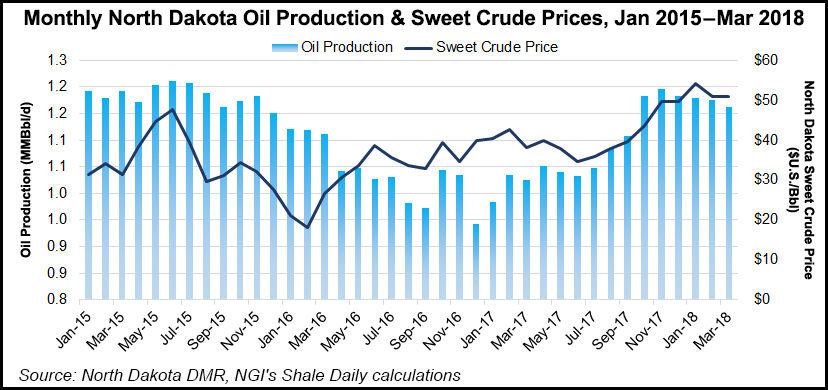Bakken Shale | E&P | NGI All News Access | NGI The Weekly Gas Market Report
Bakken Poised to Set New Oil Production Mark, Continue Record Natural Gas Gains
Bakken Shale oil production in North Dakota is on track to establish a new daily production record, most likely this summer, while natural gas production is also expected to keep increasing, state and industry officials said Tuesday at the opening of the Williston Basin Petroleum Conference (WBPC) in Bismarck.

“We think this is the month we break the oil production mark above 1.2 million b/d, but natural gas has set records month after month after month, too,” said Lynn Helms, director off the Department of Mineral Resources, which oversees the oil and gas industry.North Dakota Petroleum Council (NDPC) President Ron Ness echoed Helms predictions, noting that this year’s conference may draw up to about 2,700 participants. NDPC is hosting the event.
“I think we all agree that now that the road restrictions [statewide since winter] have been lifted, we are going to break the all-time oil production record and it will probably be in June, and that’s a big deal,” Ness said. “It seems like we’re definitely back in a growth mode.”
Helms and Ness previewed the three-day industry meeting as a showcase for change in the industry’s operations. The last WBPC meeting in Bismarck was two years ago. Well completion technology has totally changed since the, said Helms. “Two years ago it was bigger hydraulic fracturing jobs, with more stages, and now it is very focused and the way it is being applied is brand new, even though the size of the frack jobs haven’t changed,” he said.
“They are measuring rock properties while they are drilling these wells and focusing the fracture on foot-by-foot rock properties,” Helms said.
Another topic Helms was touting for discussion at the WBPC is enhanced oil recovery (EOR), and it is an oilfield practice he expects to see a lot more of in the Bakken in the months and years to come. Bakken EOR is being tested, and Helms is expecting a lot more discussion about the prospects. “We have the potential to double or triple the recovery from the Bakken formation,” he said.
Ness responded to a news media question about gas capture to underscore its position as a major focus of the NDPC, but he also called out the Fort Berthold Reservation as a growing major source of Bakken production, noting that the latest volumes there stand at about 315,000 b/d. Helms added that all four of the most recently added rigs were on Fort Berthold, where flaring has been an issue in a part of the state that has long been a production stronghold.
Regulatory and rights-of-way permitting bottlenecks on the reservation are a focus of the petroleum council as are a number of new pipeline technology advances that are being developed, Ness said. “The [North Dakota] Industrial Commission last week approved $1.4 million for the i-Pipe Project, which is being led by a half-dozen Bakken producers that have formed a collaboration on advancing leak detection and mitigation technology.
© 2024 Natural Gas Intelligence. All rights reserved.
ISSN © 2577-9877 | ISSN © 1532-1266 | ISSN © 2158-8023 |
